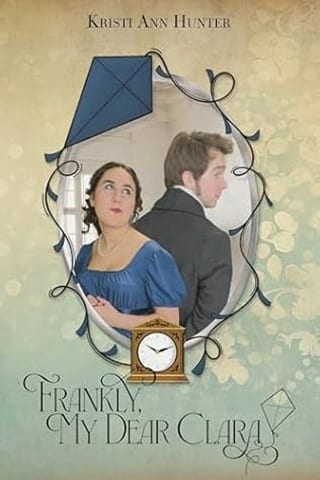13. Chapter Thirteen
M r. Pitt indeed came to visit Clara. He was, in fact, the only man to come visiting. They took tea and discussed the previous night’s ball. Aunt Elizabeth carried as much of much of the conversation as Clara. Possibly even more.
Clara had not anticipated how awkward it would be to try to have a discussion or get to know a man with her aunt and mother in attendance. She couldn’t say anything without examining the sentence in her mind first to make sure the two chaperons would approve.
It had to have been even worse for Mr. Pitt. No wonder he didn’t seem inclined to speak of anything of consequence. The situation must feel like something of an inquisition.
Had society always been like this? No, it couldn’t have. There were certainly cases of parental involvement in Biblical marriage accounts, but that was different than today’s brief visit.
Mr. Lockhart’s words from that morning drifted into her head, reminding her that people and societies grew and developed and changed over time. She pushed the words away. Yes, the world changed, but God did not, so the idea of accepting new technologies and conveniences did not change the consistency of character a person should possess.
Her confidence in that stance was more than a little shaky, though.
She considered the idea off and on throughout the day, as she drank cup after cup of tea, and visited with her aunt’s friends that stopped by for a chat but were secretly wanting to know if Clara’s Season had managed a successful start.
As the only other man to come calling was an older gentleman who seemed more interested in Clara’s widowed aunt than Clara, she would guess that most of London would consider her entry to society as less than a splash.
Mr. Pitt had come by, though, so in Clara’s mind she was well on her way to success.
At least, she wanted to see things that way. The words of a tradesman had her second-guessing that way of thinking, though.
Even as she prepared for that night’s gathering, the early morning conversation played through her mind. Was it London that was the problem, or was it her?
Exactly whose fault was it that she felt out of place in this city? Then again, it was possible no one was to blame because her discomfort wasn’t a fault. It was merely a preference of lifestyle.
But if that were the case, it meant she was wrong about the darkness and depravity of London, and she simply couldn’t accept that based on her recent observations.
The swirl of thought was enough to leave her quite out of sorts. Her heart thumped hard enough in her chest that drawing a full breath was difficult as she walked beside her aunt into another ball.
Candles flickered everywhere until there was nary a shadow to be found in the grand ballroom. No one would be escaping to dark alcoves tonight, it would seem. Not that she had plans of doing so, but she’d heard the whispers in the retiring room and the plainly spoken speculation in her aunt’s drawing room.
She took a deep breath and stepped further into the room. This new trepidation was silly. Her situation was the same today as it had been yesterday before she talked to Mr. Lockhart.
Because she didn’t want to be a burden to her parents, she needed a husband.
Because she loved her mother, he needed to be somewhat socially acceptable.
Because she wanted to be like her father, he needed to have a heart for the people around him.
Because she wanted to truly know the people who surrounded her, he needed to want a fairly quiet life in the country.
Daunting though such a task might seem, she was confident that she’d found the perfect candidate, so it didn’t matter what Mr. Lockhart thought of her view of the world.
Except . . .
She sighed. Choosing a man was one thing. Getting him to choose her back was another. Yes, Mr. Pitt had come to visit today, but she had to admit he hadn’t looked to prolong his stay beyond the point of politeness.
He lived primarily in London, which meant he understood the expectations of the Season. If she wanted to garner more than a passing curiosity from him, she needed to show that she knew how to socialize.
Fortunately, God had provided Clara with an expert.
“Where would you like me to go, Aunt?”
“You’ve finally seen the light, have you?” Aunt Elizabeth gave an approving nod, the feather in her hair bobbing in merry agreement. “We’ll place ourselves near that end of the room. It doesn’t appear to be where the top-tier debutantes are gathering, but, well, you’ll be able to make some friends between dances. That looks good. No man wants an unliked bride.”
Clara refrained from frowning, but only by sheer force of will.
As they approached the area, Clara searched the faces of the well-dressed ladies and the handful of gentlemen engaged in conversation. She didn’t know any of them.
Aunt Elizabeth made the introductions, beaming at the entire group. She then stepped aside to strike up a conversation with two other nearby matrons.
Though it was difficult, Clara maintained her smile as the group indulged in the common idle chatter new acquaintances relied upon. Even though it was necessary, she found the situation tedious. It was so much easier when everyone already knew each other and people were willing to discuss their true feelings and problems.
That wasn’t the way of London, though, and Clara was determined to make a show of giving the city a try so that Mr. Lockhart couldn’t accuse her otherwise when she declared the area unacceptable.
“I believe I saw you last week? At a dinner Mrs. Benneton hosted?” Miss Harlington smiled, her lips the same shade as her pale pink gown. The expression didn’t feel all that welcoming, despite the curved lips. Perhaps it was the flatness of her eyes.
Clara returned the smile, hoping hers looked more natural than Miss Harlington’s. “Yes. I was there. It was my first London outing, actually.”
“Oh?” Her eyebrows lifted as she looked Clara up and down. “This is your first time in London?”
“Where are you from?” Another girl, whose name Clara had already forgotten, asked.
“Eldham.”
“I’ve never heard of it. Is it quaint?”
“Oh, it’s lovely. There’s a glorious field outside of town. It’s surrounded by trees, but you get the most glorious views and the breeze comes through there in the summer.” Clara’s smile felt far more natural as she spoke of home.
Miss Harlington’s still looked rather wooden. “I myself find the summer breezes do very inconvenient things to my bonnet strings.”
“Oh yes,” the other girl said. “I spend half my life redressing my hair when staying in the country.”
“Such a shame you’ve had to wait so long to experience London. You must be, what, three and twenty?”
It was now Clara’s smile that was forced. Clearly Miss Harlington was not in the mood to make new friends. “Not quite yet. I am but two and twenty.”
“If you truly want to experience a relaxing summer, you should travel to Bath,” Mr. Payne said.
“Oh, yes.” Miss Harlington clasped her hands together as she rolled into an account of the healing waters and fashionable assemblies. “It was very restorative.” She fluttered her fan and her eyelashes.
Clara’s stomach fluttered in disgust.
Still, she smiled and nodded in all the right places until the string quartet in the corner began to play. The men each selected a lady and departed for the dance floor, leaving Clara, the girl without a name, and another young lady with a particularly pinched expression standing in a cluster on the edge of the floor.
Perhaps Clara could make headway now that the group was smaller. “Have you been to the theater this year? I hope to attend soon.” It was the one city indulgence she’d been looking forward to in London.
The girl with the pinched face managed to pucker her expression even more. “Do you find life so unappealing that you must pretend to live someone else’s for an evening?”
Clara’s mouth dropped open a little as the girl beside her sidled away, chirping, “Oh, my, I believe my mama is beckoning me.”
It would now be unspeakably rude for Clara to beg a need for punch or some other excuse. She would have to remain in this unhappy girl’s company.
“The frivolity is rather cloying, is it not?”
Clara made an indeterminate noise that might or might not have been agreement. At least she could find comfort in knowing that despite her lack of success—and she had to admit her attempt at conversation had fallen flat—she wasn’t the most unsociable person in the room.
This wasn’t what people thought of her, was it?
Just as the couples were squaring off to begin the dance, a gangly fellow approached her end of the ballroom. She didn’t know him, had never been properly introduced, but she’d agree to dance with him anyway if it got her away from this conversation.
But he didn’t ask Clara.
He asked the pinched-face girl.
What she wouldn’t give for the closest alcove to be just a little bit darker right then. She set her teeth and resolved to learn more from the evening.
There’d be another chance tomorrow.
Hugh had spent most of his life knowing exactly who he was. Whether it was as a dutiful son, an obligatory apprentice, or an overworked shop clerk, his role in life had always been obvious. Thanks to his uncle, he’d grown up knowing that role wasn’t who he was as a person, but even a child of God had a place he belonged in the world.
Now, though, Hugh didn’t even know which door he was meant to enter the house through. He’d come in through the front door the day he’d come for dinner, but now that he was essentially working here, it felt necessary to enter through the kitchens.
His time in the house, though, was hardly spent like a servant’s would be. It was almost like he was renting a room but without the exchange of money. He worked on his own projects and was occasionally pulled into conversation with the master of the house. Such activity would imply he was more of a guest than an employee.
And yet . . .
Hugh slid his hands along the brim of his hat as he climbed the stairs to the ground floor of the house. Today he’d opted for the kitchen door, but it had been an uncomfortable entrance for all involved.
There were so many confusing elements to his current position that it was best to just stumble along as best he could and hope it all worked out.
At the top of the stairs, he turned to head toward the drawing room he’d been directed to but almost ran headfirst into Mr. Woodbury.
“Goodness, my man.” Mr. Woodbury chuckled and steadied himself with a hand on Hugh’s shoulder. “Didn’t know you were there. I was just with Ambrose, though, and I don’t recall Hodges announcing you.”
“I, ah, came in through the kitchens.”
He frowned. “Why would you do that?”
“Because that’s what people of a certain rank do.” Perhaps the athletic man wasn’t as bright as Hugh had originally given him credit for.
Mr. Woodbury grinned and pointed the deck of cards in his hand toward Hugh. “That’s the beautiful thing about a home. Guest is a most honored rank.”
“But I’m not a guest.”
“Did the lord of the manor ask you to be here?”
Hugh could see where this was going, but there was no stopping it now. He sighed. “Yes.”
“Do you have any specific tasks to do while you’re here?”
Technically speaking, he did have a specific task to do, but it wasn’t being watched over by Lord Eversly. “Not as such.”
Mr. Woodbury nodded in recognition of Hugh’s decision to not deliberately misunderstand the question. “Are you being paid to be here?”
With a lift of his eyebrows, Hugh said, “After a fashion.”
Mr. Woodbury shook his head. “No. I was there for the agreement. Your bills are being paid, not you.”
It was a fine point of distinction, but Hugh had to acknowledge it was true. A single dip of his chin was the only admission he was willing to give.
“See? You are a guest.” Mr. Woodbury stepped to the side. “Hodges, are you there?”
The distinguished older man stepped into the front hall. Hugh leaned to the left, trying to see which room the man had materialized from. Had he been listening in? Probably. Lurking was the best way to know everything that was going on in the house, after all.
“You called, sir?” The butler inclined his head toward Mr. Woodbury and then Hugh.
“Mr. Lockhart here”—Mr. Woodbury clapped a hand on Hugh’s shoulder—“is to be allowed entrance to the house through the front door when he comes and goes. It’ll probably be odd hours of the day, but he’s got free access to that back drawing room.”
The butler’s gaze slid briefly to Hugh before returning to Mr. Woodbury. “I have already been instructed as such by his lordship, sir.”
Mr. Woodbury gave Hugh a slight shove as he lifted his hand. “You see? Guest. Just walk up and knock.”
Hugh knew better than to argue with the butler who wasn’t about to argue with the man in charge of the house. If Lord Eversly wanted Hugh to use the front door, he would use the front door.
Even if the idea made him feel even more out of place than before.
Hugh gave the butler a respectful nod. “I shall endeavor not to arrive at too inconvenient an hour, Hodges.”
“Now that we’ve settled that, come up to Ambrose’s study.” Mr. Woodbury waved the deck of cards in the air. “He’s making me play Speculation.”
Hugh should make an excuse. He had limited time and light with which to work, but it had been so long since he’d done something just because it sounded fun.
Besides, keeping his investor happy with him could only be a good thing.
Hugh waved a hand toward the stairs. “Lead on.”
“Excellent.”
The card game didn’t last long, and they quickly ended up back in the billiard room. Hugh kept one eye on the clock and another on the light coming through the window. Fun or not, rare or not, he still needed to spend time in his work room if he wanted to finish his chronometer.
He leaned over the table, sent the trio of balls bouncing around the bumpers, and scored enough points to call it a win.
“Good game, Hugh. May I call you Hugh?” Lord Eversly took a drink from the tumbler of scotch that had been ever present all evening.
Either he was taking the smallest sips known to man or he was adept at secretly refilling his glass. Not knowing which it was only bothered Hugh because it was impossible to know how genuine his apparent friendship was.
“I would be honored for you to use my name.” Hugh slid the cue into the rack.
“Excellent.” Lord Eversly gestured toward Hugh with the hand still holding the glass of amber liquid. “In private, you may call me Ambrose.”
“Even though that’s not his name.” Mr. Woodbury stored his own cue as he laughed.
Ambrose frowned. “It is so my name.” He shifted his weight. “It just isn’t my first name.” The viscount sighed and added, “My first name is Richard, but my father’s name was Richard as well, so growing up everyone called me by my second name, Ambrose. My full name is Richard Ambrose Whitney, Viscount Eversly.” He winced. “Mother always said it was because I was enough trouble for three little boys.”
“As she would have saddled you with the moniker before you’d had a chance to misbehave, that would seem to be a self-fulfilling prophecy,” Hugh muttered before he could stop himself.
There was a beat of silence and then both men started to laugh.
“You’re all right, Hugh Lockhart.” Ambrose nodded.
The discussion rolled on for a few more minutes until the viscount began discussing his plans to go out for the evening. At that point, Hugh removed himself before they could try to rope him along on that misadventure.
In the quiet of his small drawing room, he took a few minutes to consider how quickly life could change. Things he’d never allowed himself to want, never allowed himself to think of as lacking in his life, were coming his way.
Without his permission, his gaze slid to the seat by the door where Miss Woodbury had sat that morning.
He shook his head and gave his attention to the chronometer. It wouldn’t do to be greedy. His life had the potential to be better than he’d dared to dream. He wouldn’t risk that by thinking he could reach for the moon.
 Fullepub
Fullepub 



